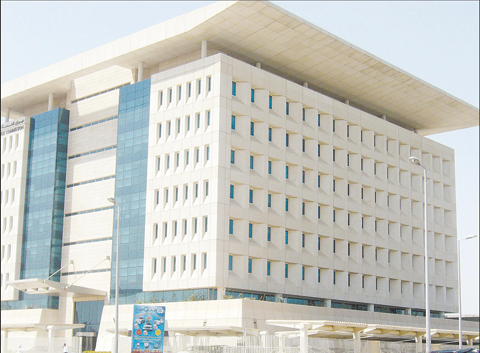 KUWAIT: The head office building of the Civil Service Commission; the state authority that handles payment of public sector employees’ salaries.
KUWAIT: The head office building of the Civil Service Commission; the state authority that handles payment of public sector employees’ salaries.KUWAIT: Well-informed sources said that a study on restructuring government sector payrolls under the supervision of the finance ministry is almost complete after going through several phases over the past three years. The sources added that government employees' salaries are accordingly expected to be restructured by the beginning of 2019.
The study aims at equaling employees' incentives and salaries, the sources added, stressing that the study would not lead to reducing salaries, and would, contrarily, lead to increasing some by paying the difference between high and low wages paid to employees with the same qualifications. Notably, the study was done by a specialized company that set the principles of the new payroll alternative, giving more incentives to outdoor employees than those working in offices. The total payroll item in the 2016-2017 budget was KD 16.7 billion ($50 billion).
Craftsmen allowances
The cases and legal studies manager at the Manpower and Government Restructuring program (MGRP) Fawwaz Al-Mutairi stressed that MGRP implements the laws related to paying social and child allowances to craftsmen working for non-governmental bodies in accordance with law number 391/2001. Responding to a verdict issued recently by the constitutional court in a case filed by a citizen contesting the constitutionality of clause no. 4 of article five of the aforementioned Cabinet decision, which was amended by decision number 572/2009 pertaining entitling employees older than 25 to get the allowance and depriving younger ones from pursuing further studies while in service, which is considered an unjustified discrimination.
Mutairi added that the national labor support act encourages citizens to work for non-governmental bodies in return for paying those working in handcrafts social and child allowances according to CSC regulations. He added that according to the constitution, all citizens are equal in rights and duties, which includes the right to have a job and a stable social life. "Accordingly, I suggest reducing the gap between the salaries and incentives given to citizens for working in different bodies in order to make the best use of national human resources as well as activate non-governmental bodies' role as partners in development," Mutairi stressed.
He explained the conditions of getting social and child allowances include working within Kuwait, being registered with the social security authority, being at least 21 years old for bachelors and 18 for married citizens, having at least one child, not being registered in an educational facility with the exception of those older than 25 and should be working for a non-governmental body for at least three years without getting any pension.
Housing plots
An official at the Public Authority for Housing Welfare denied recent reports suggesting that citizens who have housing plots allocated in Sabahiya, Abu Halaifa and South Khaitan can sell them before 10 years have elapsed. He said a regulatory decision by the Cabinet stipulates that citizens cannot do anything with the plots until the set period has elapsed.
Eighth Ring Road
The Ministry of Public Works said that the Eighth Ring Road project was cancelled due to security risks, because it goes through the Burgan oilfield. The ministry contracted an international consultation office on the 60-km project from Fahaheel Expressway that will intersect the southern regional road.
By A Saleh










